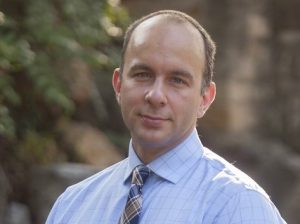Marko Dumančić ’10 PhD Explores Conceptions of Masculinity in Eastern Europe and Russia
September 11, 2017UNC Global Affairs

Marko Dumancic '10
Despite growing up in Croatia, attending high school and college in the Northeast United States, and teaching at universities in Ohio and Kentucky, when Marko Dumančić returns to the University of North Carolina at Chapel Hill for a public talk this fall, he feels like he will be coming home.
“I spent eight or nine years in Chapel Hill and Carrboro. Part of me feels like I never left,” he explained.
Dumančić’s talk, which will take place in room 4003 at the FedEx Global Education Center on Wednesday, September 20, will focus on a topic he has been interested in since he was a teenager: masculinity in Russia and Eastern Europe. In his talk, entitled “Stonewall Never Happened: Conceptualizing Queer History and Rights in Russia and Eastern Europe,” Dumančić will explore LGBT rights movements in Russia and Eastern Europe. He will discuss how these movements differ—and should differ—from movements in the United States and Western Europe, where incidents like the 1969 Stonewall Riots in New York City sparked major changes in policies and perspectives.
“When we look at Eastern European history and Eastern European gay rights movements, we always imagine that it’s going to look exactly like the American story,” Dumančić said. “You’re going to have a version of Stonewall and pride parades and fights for legal rights, and if it doesn’t look more or less like the American model, then something has gone wrong. My talk is going to be about how to understand Eastern European gay rights movements by removing the need to look at Stonewall and the American model as the one to follow.”
Dumančić has been intrigued by the concept of masculinity since he read an article on the subject in The New Yorker when he was 16 years old. He had recently moved from Croatia to the United States with his mother, who was pursuing her master’s degree in bilingual education at Boston University.
“I was really fascinated by the processes by which men start thinking of themselves as men, and how you go about behaving ‘as a man’ and what goes into that kind of performance,” Dumančić said.
After graduating high school in Boston and earning his undergraduate degree from Connecticut College, Dumančić decided to pursue his interest in masculinity studies in a doctoral program in UNC-Chapel Hill’s Department of History. In 2006, he traveled to Russia for research on his dissertation, a study of how perspectives on gender roles changed after the death of Stalin.
“World War II changed conceptions of femininity so that it became more possible for women to be members of the workforce and vote,” Dumančić said. “I wanted to see if the death of Stalin actually impacted Soviet lives and Soviet understanding of what it meant to be a man and a woman in a similar kind of fashion.”
After completing his dissertation and graduating from UNC, Dumančić went on to teach at Oberlin College in Ohio for three years. Now, he is an assistant professor and director of graduate studies for the history department at Western Kentucky University in Bowling Green.
In his courses on the Cold War, modern Russia and Eastern Europe, he argues that masculinity, including homophobia, is socially constructed.
“I try to identify the problems, but I also try to give my students a sense of perspective in that people change, cultures change, and so ideas about masculinity can also change to be more positive and productive,” he explained.
Dumančić says that homophobia is often viewed as inherent in Eastern European cultures, and part of his interest lies in figuring out where that homophobia comes from. He connects ideas of masculinity with social issues such as domestic violence, homophobia and hate crimes, and says that understanding how these perspectives arise is key to solving those problems.
“I think violence committed by men against women and other men is kind of a pandemic,” he said. “Understanding why men behave the way they do and where our ideas about how masculinity is supposed to be acted out come from is hugely important if we’re going to try to solve a range of social ills, starting with domestic violence and ending with hate crimes.”
“For me it seems imperative for all kinds of social issues to understand how men behave, why men behave the way they do and where these ideas come from.”
